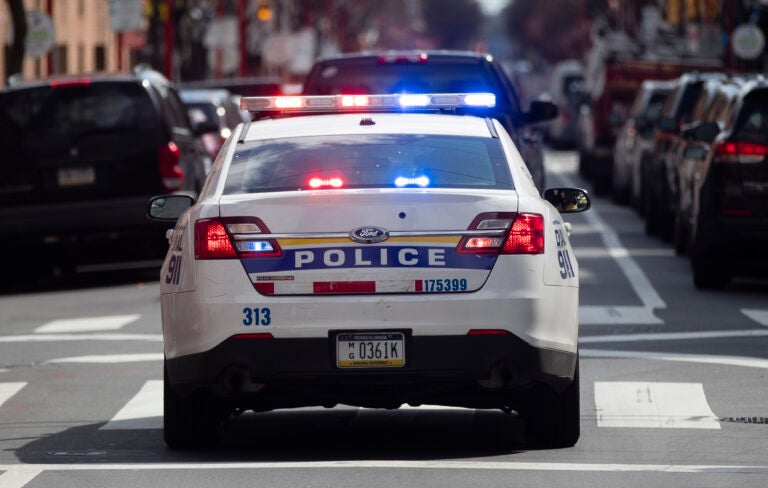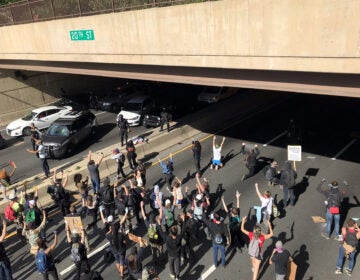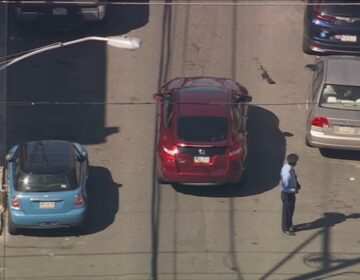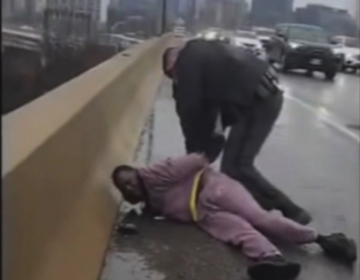Police misconduct in Philadelphia: Unsealed records name the city’s most cited cops
Even if officers assault civilians, they rarely face repercussions — and sometimes get promoted, newly released documents show.

A Philadelphia Police Department cruiser is pictured in this file photo. (AP Photo/Matt Rourke)
Minutes before his life ended, U.S. Army veteran Angelo Slaughter was with his two young sons on the steps of their Southwest Philly rowhouse. That night in 2006, police officers appeared on the block to question suspects over a drug transaction that had allegedly taken place earlier that day.
Two plainclothes officers approached Slaughter to question him. What happened next is a matter of dispute — a story where the distinction between self-defense and a police murder hinged on the position of Slaughter’s arms.
Philly Police Officer Sharrod Davis, who had joined the force three years prior, told investigators that Slaughter abruptly turned and pointed a gun at him, after which the officer fatally shot the veteran once in the chest.
Slaughter’s family, meanwhile, maintains he had his hands up.
“They ran up on him from behind,” Slaughter’s sister, Tangela Johnson, told WHYY and Billy Penn. “He turned around and put his hands up. [The police officer] was searching him with a gun to his chest and felt [my brother’s] service weapon,” a .45 caliber semi-automatic pistol that was later recovered at the scene.
Feeling the weapon, Davis allegedly yelled, “Gun!”
“And then he shot him,” Johnson said.
Slaughter was one of 22 men killed by police during what turned out to be a record-breaking year for police shootings in Philadelphia. As with the vast majority of those cases, investigators ruled Slaughter’s killing was justified.
In the decade-and-a-half since the Slaughter shooting, Davis has been investigated dozens of times over other incidents. His record is among the most checkered in the department and includes allegations of theft, abuse, multiple off-duty altercations and two other controversial shootings, including one that nearly killed a second man.
But instead of being sidelined, Davis was eventually promoted to an elite patrol unit, where he still serves today. And he’s not alone.
Davis is one of 16 officers on the 6,500-member force who drew 10 or more civilian complaints over the past five years. Altogether, the small group racked up an astounding 188 different civilian complaints, according to an analysis of disciplinary records unsealed at the request of WHYY News and Billy Penn.
Philadelphia stands apart from other major cities in terms of the sheer number of complaints its most troubled police receive — and the lack of transparency around these records.
Lawyer: Officers on the street get ‘slaps on the wrist’
In Boston, the most oft-cited officers draw around one complaint per year. Derek Chauvin, the former police officer who killed George Floyd in Minneapolis, also averaged about one complaint annually during his 20-year career. In Philadelphia, meanwhile, at least 56 cops hit or exceeded that once-a-year average, with the worst accruing more than three complaints every year.
Some other cities, like Chicago, have made misconduct records public. Advocates say Philadelphia lags behind, as online complaint records are available only in a heavily redacted and anonymized format.
“There’s a severe lack of transparency in police misconduct cases,” said Philadelphia civil rights attorney Kevin Mincey. “It allows for these officers who shouldn’t be on the street to get slaps on the wrist.”
Philadelphia is similar to other big U.S. cities in that these kinds of complaints, no matter how voluminous, rarely derail a police officer’s career.
The complaints are supposed to act as an internal early warning system. More often, however, accused officers end up like Davis, with whom department investigators sided in at least 27 disciplinary investigations during his 17-year career.
Longtime civil rights attorney David Rudovsky faulted Philly’s system as biased in favor of officers. Some Internal Affairs Bureau investigations drag on for years, he noted, and are then subject to additional review from a secondary disciplinary board and union arbitration.
“When you look at the history of the Philadelphia police, you see large numbers of cases that have never been investigated properly,” he said. “There are credible claims and the department just says ‘Not sustained.’”
The PPD has rejected close to 85% of more than 10,000 civilian complaints filed since April 2013, with most of the rest resulting in retraining or counseling. Only 219 out of all formal investigations resulted in guilty findings.
For the most serious charges leveled at officers, like physical or sexual abuse, only 1.7% were found guilty: 59 of 3,308. And while about two-thirds of complaints were filed by Black people, the Internal Affairs Bureau was 21% more likely to recommend disciplinary action when a white person filed a complaint.
Retired officer: High crime beats can lead to more complaints
Steve Nolan, a retired PPD lieutenant who spent 20 years as an investigator with the internal affairs unit, believes patterns of abuse are more significant than high volumes of complaints.
“These guys are sent into the high-crime areas, and they’re going to be more apt to have contact with citizens,” Nolan said. “The more contacts you have, the more chance they have to get a complaint against them.”
He personally investigated and disciplined Davis, the officer who killed Angelo Slaughter, over another near-fatal on-duty shooting in 2014. Nolan said he didn’t see signs of a rogue cop, just another officer in a tough district.
“Over the course of my career, there are guys you could look at and say, ‘This guy could start a fight in a phone booth,’” Nolan said. “Sharrod Davis never struck me as a cowboy, or somebody with a chip on his shoulder, or a jerk-off who’s out to get people. He didn’t strike me as a guy who’s out of control.”
While the most-complained-about cops became well known to the department’s Internal Affairs Bureau –– often clustered within certain districts or even working as patrol partners –– there’s little evidence any were even placed in lower-stress assignments after years of complaints.
In fact, both Davis and another officer that topped the department in complaints, Robin Song, were promoted to Highway Patrol over the last few years. Despite its name, this unit is tactically deployed to trouble spots across the city, making it a high-intensity role coveted by officers who prefer aggressive streetwork.
“The Highway Patrol is home to the most highly decorated and dedicated officers within the Philadelphia Police Department,” reads a description on the unit’s website. “Officers in this elite unit have always been and will continue to be the ‘Best of the Best.’”
Complaints pile up for handful of officers in few districts
The typical patrol officer in Philadelphia often goes years without getting a single complaint.
Only 1% of the department averaged more than a single complaint per year since 2015, according to the WHYY and Billy Penn analysis. A fraction of officers — about 260 out of 6,500 — made up nearly a quarter of all complaints department-wide.
Fully half of all allegations of physical abuse came from six out of 21 police districts. While these six tended to be districts with above-average rates of crime, that was not always the case.
For example, the 14th District. The area, covering Upper Northwest Philadelphia, saw less criminal activity than other districts during the time period analyzed, yet five of the 16 men that led the department in civilian complaints served in the precinct (including Davis, prior to his promotion). The district drew criticism after a report found that Black drivers were three times more likely to be stopped there than white drivers.
Officers David Dohan and Lucas Lesko worked as partners in the Northwest Philadelphia patrol area and were named in incidents like the alleged beating of a suspect they caught urinating in a back alley.
Years after that incident, they and other 14th District officers, including Brad Momme and Sgt. Marc Monachello, still lead the PPD in civilian complaints, all averaging around three misconduct claims per year.
Lesko, Dohan and another officer, Perry Thornton, also lead the department in physical abuse allegations — six per cop over five years. While just 15% of all complaints filed with the department were categorized as physical abuse, 40% to 50% of the complaints filed against these three included allegations of brutality.
Thornton stands out as a magnet for misconduct allegations in a district with comparatively low rates of crime. Assigned to Center City, Thornton racked up as many as seven complaints in a single year, more than any of his peers drew. In all, he was listed in one out of every six complaints filed in the 6th District since 2015 and was named in a federal lawsuit over a beating incident with two other officers that was ultimately dismissed.
North Philly’s 35th District was another hot spot; three officers there racked up a combined 33 complaints. Two officers in West Philadelphia’s 19th District — once led by former Inspector Joseph Bologna, who now faces aggravated assault charges for beating protesters — also stood atop the complaints list.
But no one on the force drew more complaints than Officer Marc Marchetti, assigned to Southwest Philadelphia; 16 were lodged against him over the past five years, about 75% of which were dismissed (One charge is still listed as pending).
Attempts to reach certain officers, like Sharrod, for comment were not successful. The department declined to make any of the named officers available for interviews. The Fraternal Order of Police did not offer comment on any of the officers behalf.
Interviews were also declined with their commanding officers. PPD spokesperson Sekou Kinebrew, who previously served as captain of the 14th District and oversaw some of the officers on this list, including Davis, said he too could not talk about the officers on the record.
“As a matter of practice, we don’t publicly discuss the performance of individual officers,” Kinebrew said.
Even when dismissed by internal investigations, critics say a notable volume of complaints merits a deeper look.
“Even if you have 15 complaints and none were founded, that still raises questions. Why is he getting 15 complaints?” said Rudovsky, the civil rights lawyer. “It’s just a very high number. Something is going on.”
Davis’ alleged year: car crashed, 15-year-old assaulted, man maced, bystander’s nose broken
There are police who retire without ever discharging their weapon, but Officer Davis’ first shooting occurred about a year-and-a-half into the start of his career.
In October 2004, the officer who would kill Angelo Slaughter two years later was inside a local convenience store when he allegedly saw a gun protruding from the waistband of another man in the store. He waited outside for the man, who bolted when the officer identified himself. As the man attempted to flee, Davis fired two shots. When he later apprehended the suspect, they did indeed have a loaded firearm, according to Internal Affairs records obtained by WHYY News and Billy Penn.
While some of this proactive police work ended positively for Davis, other actions led to problems.
Davis was investigated internally for crashing a police car during a chase in 2005. The same year, he drew complaints for allegedly assaulting a 15-year-old girl, allegedly beating up a second man, macing a third, and threatening to “beat the shit” out of a fourth man he caught urinating near a city courthouse. About six months after the macing incident, a man saw Davis arresting his mother and, when he asked what Davis was doing, the officer allegedly turned and punched him in the face, breaking his nose, the man told investigators.
Investigators reprimanded the officer over the car, but eventually tossed the rest of the complaints. The fatal Slaughter shooting happened while Davis was still being investigated over the broken nose. He had been with the force just over three years.
Nolan, who left PPD Internal Affairs in 2018, recalled a yet another shooting investigation involving Davis nearly a decade later, in 2014.
In that instance, Donte Fassett and his wife Amber Richardson were driving down a narrow street in West Oak Lane when they noticed the trunk of a Ford Taurus in front of them was unlatched. Unbeknownst to them, the unmarked car was occupied by a plainclothes-outfitted Davis and then-partner Joseph Gomes.
Fassett tried honking his horn in order to alert the drivers, then pulled next to the car, motioning with his hand toward the trunk lid of the undercover cops’ vehicle. Davis asserts Fassett was pointing a firearm in their direction.
Both officers drew their service weapons and fired 13 rounds at the adjacent vehicle, continuing as the car sped quickly away. Fassett was struck once in the skull.
The officers caught up with Fassett after he collapsed several blocks away. The shooting victim was booked on a battery of offenses and sent to jail. But court records show a jury acquitted Fassett at trial, describing the prosecution as a coverup for an unjustifiable shooting. The city later settled a civil case for $325,000. (Fassett, through his attorney, declined to comment.)
Nolan, the IA investigator, ruled at the time that Davis had violated departmental guidelines by firing as Fassett attempted to flee. A police review board later overturned that disciplinary ruling, and overall, IAB found the shooting was justified.
Davis was temporarily reassigned to serve as a community relations officer within the 14th District, scoring the coveted slot in the department’s elite Highway Patrol unit a few years later
Public accountability over these investigations remains limited. Officer’s full disciplinary files are shielded from public sight. The Kenney administration last year scrubbed details from the complaint descriptions on its public database of civilian complaints — a move the city vowed to reverse course on in recent weeks.
Because of these shifts, it’s difficult to say exactly what officers like Davis have been accused of in more recent complaints.
What is clear is that since being reassigned to Highway Patrol, Davis has been named in eight more civilian complaints –– with incriminating details now shielded from public eyes.
More promises of an ‘early warning’ system that works
Department leadership has known for decades that the Philadelphia Police Department is slow to react when its officers receive repeat brutality complaints.
A 1996 court case brought by the NAACP, ACLU and the Police-Barrio Relations Project alleged systemic misconduct within the PPD. To settle the case, then-Mayor Ed Rendell authorized monitoring that included the implementation of an “early warning” system using civilian complaints and other information.
The goal was to allow supervisors to intervene before misconduct spiraled into on-duty violence.
A 2003 report from the Integrity and Accountability Office, an oversight entity also created during the NAACP settlement, found the disciplinary system “ineffective, inadequate and unpredictable.” The oversight office said commanders viewed the system with “resentment, cynicism and suspicion” and “did not seem to understand the goal or purpose.”
But then-Mayor John Street dissolved the oversight office shortly before 2006, a record-breaking year for fatal police shootings of civilians in Philadelphia. Later, the Department of Justice intervened, reprimanding the PPD over its use-of-force policies.
While the city also continues to settle misconduct lawsuits against police officers — costing taxpayers around $10 million each year — reform advocates like Rudovsky say the department has made strides in reducing fatal incidents in recent years.

Subscribe to PlanPhilly
But documents show that even basic disciplinary practices are lacking – some district captains were not even notified when their own officers racked up serious complaints, for example. A 2015 memo obtained by WHYY News/Billy Penn — from former 1st District Captain Lou Campione, recently reassigned after Columbus statue protests — expresses frustration that he was not alerted to a sudden rise in civilian complaints in his district.
“Our [complaints against police] were up 33% for the year and the captain was notified of only one,” reads the memo, which was signed by Campione. “This is unacceptable.”
Campione declined to comment. A police department spokesperson also would not comment on the memo, but said police captains are supposed to receive weekly briefings about complaints against their officers.
Today, in the aftermath of high-profile police killings of George Floyd, Breonna Taylor and others, Philadelphia leaders continue to vow more accountability.
Mayor Jim Kenney recently pledged to increase transparency around officer discipline and create an “early warning” system that sounds strikingly similar to the one the city was supposed to have implemented two decades prior.
Financial records show that, as of 2018, the IAB unit was paying around $28,000 in annual licensing costs for software known as “IA-Pro.” But both Kenney and recently-appointed Police Commissioner Danielle Outlaw were unfamiliar with the existing alert system,
Outlaw later clarified that she meant the current system needed improvement, and that something new “will be better able to identify and modify behavior that requires correction, while also recognizing performance that merits encouragement, reward, and replication,” per a statement.
Even these yet-to-be-implemented plans do not go as far as other cities. And the cycle has repeated so often, some critics say it inspires little hope.
“They were supposed to do early warning years ago,” attorney Rudovsky said. “Why haven’t they?”
WHYY is your source for fact-based, in-depth journalism and information. As a nonprofit organization, we rely on financial support from readers like you. Please give today.








